|
|
|
Sort Order |
|
|
|
Items / Page
|
|
|
|
|
|
|
| Srl | Item |
| 1 |
ID:
159181
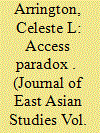

|
|
|
|
|
| Summary/Abstract |
To what extent is a diverse news media environment good for activists who seek attention for their cause? Scholars agree that activist groups depend on the media to reach policymakers and bystanders. Yet prior scholars have overlooked how factors that contribute to media environment diversity—including journalistic norms, market structures, outlets’ partisanship, and audiences’ news consumption habits—can have contradictory implications for activist groups. Disaggregating questions of gaining publicity from questions of the message and reach of coverage, this article shows that while pluralistic media environments are more accessible to activists, more homogeneous media environments help groups that manage to break into the mainstream news reach wider audiences with more coherent narratives. These findings challenge common assumptions about the news media in Japan and Korea. A paired comparison of hepatitis C-related activism in both countries demonstrates how the forces democratizing access to the media are paradoxically reducing the persuasive potential of publicity.
|
|
|
|
|
|
|
|
|
|
|
|
|
|
|
|
| 2 |
ID:
145867
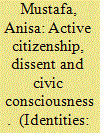

|
|
|
|
|
| Summary/Abstract |
British Muslims have confronted numerous challenges since 9/11 which have rendered their citizenship ‘precarious’ and ‘contingent’, including rampant Islamophobia and a disproportionate impact from tighter security and immigration measures. Additionally, they are also disadvantaged by new forms of governance which promote ‘active citizenship’ based on both neoliberal and resurgent nationalist demands for citizens to be more self-reliant as welfare provision shrinks. This article explores how young British Muslim civil society activists negotiate some of these challenges by analysing their discourses on citizenship and belonging. Based on an ethnographic study, it is suggested that despite experiencing exclusion and marginalisation, young Muslim activists incarnate active citizenship but with reference to a very different set of values and priorities in contrast to nationalist and neoliberal normative ideas. Demonstrating a strong commitment to civic responsibility and participation, these young Muslims defy fears that negative associations with Britishness weaken the value and relevance of citizenship.
|
|
|
|
|
|
|
|
|
|
|
|
|
|
|
|
| 3 |
ID:
120772
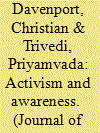

|
|
|
|
|
| Publication |
2013.
|
| Summary/Abstract |
There are a great number of outcomes for activism that are examined in the literature, but we know relatively little about how this behavior influences perceptions of the phenomena being challenged. It is possible that when one challenges some phenomenon, one begins to 'see' it more. Alternatively, activism might focus awareness on only certain manifestations of the problem of interest. The type of activism should matter here. We anticipate that only forms of resistance that increase exposure to oppression/oppressors and/or other challengers are likely to increase the number of discriminatory actions identified. Especially important here is nonviolent direct action because of the significant amount of training and interaction among activists that is facilitated by such activities as well as the extensive amount of exposure that nonviolence generally subjects participants to. Utilizing a unique database of 98,316 untouchables (or Dalits) from 1,589 rural villages in Gujarat, India, we find support for our argument. Specifically, Dalits who engaged in nonviolent action which increased either exposure to oppression/oppressors or exposure to other activists but not both, identified a higher number of discriminatory events. In short, some activism does activate some awareness. This has implications for dissident commitment, radicalization, and post-conflict political processes.
|
|
|
|
|
|
|
|
|
|
|
|
|
|
|
|
| 4 |
ID:
116054
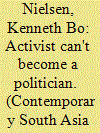

|
|
|
|
|
| Publication |
2012.
|
| Summary/Abstract |
This article explores the ambiguity inherent in the relationship between social activism and politics in West Bengal. I use a detailed account of the career of singer-activist turned politician Kabir Suman to examine the activist's view of himself and of politics, as well of how the porous boundary between activism and politics is both blurred and crossable. The fact that activists possess a kind of political capital useful within the framework of a political party may facilitate their entry into electoral politics. Yet as this article demonstrates, the activist may sometimes only be able to retain his activist credentials by sacrificing his political career. In addition, this article seeks to conceptualise the social activist as a particular type of political figure. I do so by locating the study of Kabir Suman within an emerging body of literature on political leadership in India. I argue that while the case of Kabir Suman may not be paradigmatic, his 'activist' style of leadership challenges certain contemporary classifications of political leadership in India.
|
|
|
|
|
|
|
|
|
|
|
|
|
|
|
|
| 5 |
ID:
167419
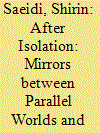

|
|
|
|
|
| Summary/Abstract |
In this article, we theoretically conceptualise the renegotiation of participatory action and activism through the formation of intellectual space that is self-reflective and upheld by what we metaphorically describe as mirrors between parallel worlds. Rethinking what activism is and how an individual relates to their social group is dependent on different levels of self-reflection, self-criticism and competing scales of insertion of other people’s struggles into one’s own political vision in an effort to intellectually rectify the local tensions that emerge in a post-revolutionary context where people are disconnected from global-level activism. A significant aspect of this analysis is our interlocutors’ imaginative capacity to draw from other people’s experiences through cultural and visual artefacts and integrate them into their own life history with the intention to address national or group-specific dilemmas. While some have drawn attention to the importance of noting how spaces for activism are remade in the post-revolutionary context due to such sentiments as disappointment, we instead examine the formation of conceptual spaces of activism within the context of isolation in contemporary Iran. Empirically, we bring together a political analysis of the novel Bevatan by Reza AmirKhani, and interviews conducted with English literature students in Shiraz.
|
|
|
|
|
|
|
|
|
|
|
|
|
|
|
|
| 6 |
ID:
106959
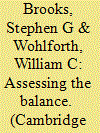

|
|
|
|
|
| Publication |
2011.
|
| Summary/Abstract |
Save for the single issue of balance of power theory's relevance to the current system, where we and some of our critics are in real disagreement (and they are wrong), every aspect of this symposium has been highly productive. Our critics do not directly dispute the proposition that a rapid end of a single superpower world is extremely unlikely. They generally endorsed our core finding that the systemic constraints featured in IR scholarship are largely inoperative with respect to a United States that remains the sole superpower. These essays are consequently devoted mainly to discussing the implications of our findings and the future research agenda. In particular, they developed serious challenges to the idea of US led institutional revisionism, generated new ideas about both systemic and non-systemic constraints, and suggested potentially powerful theories about constraints on other states besides the United States.
|
|
|
|
|
|
|
|
|
|
|
|
|
|
|
|
| 7 |
ID:
191705
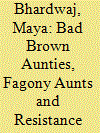

|
|
|
|
|
| Summary/Abstract |
This article offers an urgent complement to the trope of the South Asian aunty as an agent of discipline, shame, heteropatriarchy and tradition by exploring the counter-archetype of the resistance aunty—the radical feminist aunty who holds down social movements—in the South Asian diaspora. This article centres a queer lens on transgressive and activist aunties, and analyses digital and in-person queerings of the aunty in contemporary social and cultural movements. Examining resistance aunties in the writing, performances, interviews and other digital and in-person cultural work of four queer South Asians in the US and the UK, this article asserts the aunty as a core agent of resistance. It develops the notion of the resistance aunty in conversation with activist aunting in Black American organising and scholarship, and locates the legacy of the resistance aunty in queer and trans movements in the Global South and in the diaspora. By applying a new theoretics of resistance auntyhood to studies of aunty labour, this article argues for the importance of queer activist aunties in nurturing and propelling transformative social movements.
|
|
|
|
|
|
|
|
|
|
|
|
|
|
|
|
| 8 |
ID:
151664
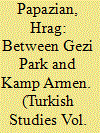

|
|
|
|
|
| Summary/Abstract |
This paper uses theories of intersectionality to study Nor Zartonk, an activist group of Istanbulite youths which is mostly comprised of Armenians. Based on ethnographic research, it first explores and analyzes the youths’ subjectivities, ideology, and activism, exposing their intersectional nature. Furthermore, through the study of this particular case the paper identifies some general potentials of intersectional positionality: first, that the politicization of one dimension of individuals’ intersectional subjectivities could pave the way for the politicization of others; second, that intersectional activists could ‘intersectionalize’ the events in which they participate, thus potentially pluralizing the socio-political implications of those; and third, that different dimensions of intersectional activism could support each other in practice and essence.
|
|
|
|
|
|
|
|
|
|
|
|
|
|
|
|
| 9 |
ID:
125915
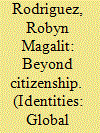

|
|
|
|
|
| Publication |
2013.
|
| Summary/Abstract |
This article traces the formation of the International Migrants Alliance (IMA) through a study of its leading organisations and central campaigns. Founded in 2008 by 108 self-described 'grass-roots' migrant organisations, the IMA is a transnational coalition of groups from nearly every continent of the world. I suggest that through their work in IMA, migrants express a new form of political subjectivity, a form of 'migrant labour transnationalism.' Migrant labour transnationalism, unlike the homeland-oriented, citizenship-based, state-supportive forms of migrant political transnationalism generally identified in the scholarship, is based on counter-hegemonic nationalisms through which migrants contest their home states' complicity with the project of neoliberal globalisation. Migrant labour transnationalism is, moreover, formed through contentious forms of political engagement and new transnational networks through which migrants are cultivating class-based collective identifications.
|
|
|
|
|
|
|
|
|
|
|
|
|
|
|
|
| 10 |
ID:
096606
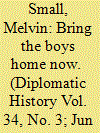

|
|
|
| 11 |
ID:
120209
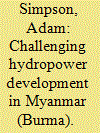

|
|
|
|
|
| Publication |
2013.
|
| Summary/Abstract |
Although general elections in Myanmar (Burma) in November 2010 have transformed the political landscape, many of the characters remain the same. While there is evidence of incremental domestic political openings many of the political constraints that existed during military rule remain in force. As a consequence of decades of military authoritarian governance and civil conflict, it is Myanmar's contested ethnic borderlands that have been the important locales for the development of environmental movements, despite increased recent domestic activity. This article analyses a case study of the largely cross-border campaign against hydropower dams on the Salween River in Myanmar and finds that through the suppression of opposition and dissent at home the regime has stimulated the creation of an 'activist diaspora', a dynamic transnational community of expatriates who engage in environmental activism beyond the reach of the regime. Due to their relative freedom on the border and in Thailand this community has developed expertise and international networks that have proved crucial in communicating the social and environmental impacts of hydropower development in Myanmar to the international community. Through increased cooperation with an expanding domestic civil society this established activist community is stimulating improved environmental governance of hydropower development and simultaneously assisting in the creation of a more open and democratic Myanmar.
|
|
|
|
|
|
|
|
|
|
|
|
|
|
|
|
| 12 |
ID:
101360
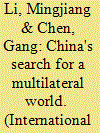

|
|
|
|
|
| Publication |
2010.
|
| Summary/Abstract |
While China will probably become more proactive in its multilateral diplomacy and increase its influence in global multilateral settings, various concerns and constraints make it unlikely that it will completely overhaul or even dramatically reshape the multilateral architecture at the global level. Stuck in defining its identity, China is caught up between posturing as a leader of the developing world on some policy issues and siding with the developed countries on others. China's involvement in global multilateralism is likely to be guided by pragmatism rather than grand visions.
|
|
|
|
|
|
|
|
|
|
|
|
|
|
|
|
| 13 |
ID:
185177
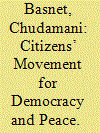

|
|
|
|
|
| Summary/Abstract |
Based on interviews with journalists, political party leaders and civil society activists, this article examines and illustrates the strategic capacities of leadership in Nepalese efforts to bolster the movement for democracy. With the help of Bourdieu’s concepts of social, cultural and symbolic capitals, the article provides insights into the crucial role of key individuals as leaders and examines their skilful use of activist synergies to spearhead significant political change in Nepal. The study demonstrates how a seemingly resource-poor movement can nevertheless mobilise the popular masses against an autocratic ruler.
|
|
|
|
|
|
|
|
|
|
|
|
|
|
|
|
| 14 |
ID:
188239
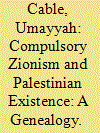

|
|
|
|
|
| Summary/Abstract |
This essay offers a genealogy of the phrase “compulsory Zionism” in order to illuminate its vexed and contradictory intellectual foundations, the ethical and political stakes of the discourse surrounding the phrase, and its accompanying racial project. Scholars of late have taken up the use of this phrase to signal how “common-sense” knowledge about Palestine and Israel is naturalized in ways that privilege Israel and subjugate Palestinian existence. However, I argue that the phrase is also useful for understanding how Palestine solidarity politics are micromanaged within transnational leftist social justice movements and academia.
|
|
|
|
|
|
|
|
|
|
|
|
|
|
|
|
| 15 |
ID:
157092
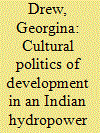

|
|
|
|
|
| Summary/Abstract |
This article examines the cultural politics of hydroelectric development produced by citizens and social movements. Focusing on contentious and competing discourses, it investigates the accusation that activists leading the fight against a series of dams proposed for the Indian Himalayan reaches of the River Ganga were motivated by their self-interested pursuit of name recognition. Through the study of these critiques—which emerged during an ethnographic research project spanning from 2008 to 2009—the article gives insight into an often-overlooked sociological phenomenon: the issue of why more people do not join dam opposition movements in contemporary India.
|
|
|
|
|
|
|
|
|
|
|
|
|
|
|
|
| 16 |
ID:
115271
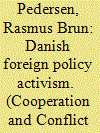

|
|
|
|
|
| Publication |
2012.
|
| Summary/Abstract |
Danish foreign policy is under transformation. Different versions of activism have gradually replaced adaptation and lately Denmark has participated more actively and independently in world politics than ever before. The core in activism is based on a liberal value system that seems to have replaced the adaptation logics dominating Danish foreign policy during the Cold War. Activism has evolved from a multilateral inspired activism in the 1990s to a more Atlantic centred activism during the 2000s. While analysts see the different phases as opposites, my argument is that the types of activism should be seen as a difference of degree rather than a difference of kind. 'Activism' as a foreign policy strategy, however, should be considered analytically as a difference in kind from the adaptation strategies that dominated Danish foreign policy during the Cold War. The main driving force behind this transformation can be found domestically in the Liberal Party's dominant position in Danish politics.
|
|
|
|
|
|
|
|
|
|
|
|
|
|
|
|
| 17 |
ID:
182616


|
|
|
|
|
| Summary/Abstract |
The professionalization of transitional justice (TJ) has received extensive academic attention in TJ and related international relations and peacebuilding scholarship. This article adds an element that has received hardly any attention: namely the presence of activism even among professional and usually donor-funded TJ work. I argue that noticing activism in professional contexts requires attention to the ‘everyday’, meaning to life in between, aside and beyond high politics and officially important actors, actions, processes and events. Based on field research in Sierra Leone and Kenya, I describe and discuss everyday examples of a specific form of activism, namely tacit activism that I encountered with three key interlocutors, one Sierra Leonean and two Kenyan nationals involved in professional donor-funded TJ work. Their activism was ’tacit’ in the sense that it was not part of their official project activities and my interlocutors did not advertise their extra plans and efforts to (prospective) donors. And yet, it was precisely through these tacit plans and efforts that they hoped to meet at least some of the expectations that had been raised in the context of professional TJ projects.
|
|
|
|
|
|
|
|
|
|
|
|
|
|
|
|
| 18 |
ID:
102165
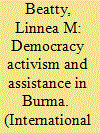

|
|
|
| 19 |
ID:
193221
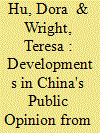

|
|
|
|
|
| Summary/Abstract |
This original analysis of the World Values Survey waves of 2007, 2012 and 2018 reveals important relationships among political trust and satisfaction, happiness, views of corruption, local elections and activism from the last half of the Hu Jintao administration through the first five years of Xi Jinping's rule. These data shed new light on the deeper dynamics underlying the high and growing levels of trust in government documented in other studies. Among this report's more novel findings, we find increased trust in government coincides with decreased local electoral participation, suggesting that participation in local elections is not key to perceptions of regime legitimacy. Views of corruption and a sense of personal efficacy through non-institutionalized forms of political participation such as peaceful demonstrations appear more relevant. Thus, constraints on people's ability to engage in peaceful demonstrations are likely to negatively impact views of regime legitimacy. In addition, the report uncovers demographic variations in these dynamics, indicating that regime legitimacy is more precarious among citizens at the bottom of the socioeconomic hierarchy and among younger Chinese. Overall, these findings complicate existing explanations of regime legitimacy centring on economic performance, nationalism, responsiveness/adaptiveness and efforts to combat corruption.
|
|
|
|
|
|
|
|
|
|
|
|
|
|
|
|
| 20 |
ID:
171351
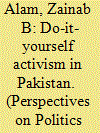

|
|
|
|
|
| Summary/Abstract |
In July 2016, Pakistani social media celebrity Qandeel Baloch was asphyxiated by her brother and gained posthumous celebrity in the West where her death was sensationally categorized as an honor-killing. Yet Qandeel was a celebrity in her own right among South Asians long before her death. Through skillful use of social media, she created new forms of public space and used them to challenge dominant social norms and political practices. I examine Qandeel’s “do-it-yourself activism”—her innovative use of the digital public sphere to position herself as a worthy representative of Pakistani nationality; to critique long-established norms governing gender, class, and sexuality; and to expand the boundaries of national belonging in Pakistan to include culturally rebellious women of limited economic means. By examining Qandeel’s audacious means of standing for Pakistan, her deployment of marriage proposals as a mode of subversive political activism within the political party, Pakistan Tehreek-e-Insaf (Pakistan Movement for Justice, PTI), and her use of visual culture (“selfies”) to challenge the moral authority of a powerful Islamic cleric, I theorize a form of political activism grounded in women’s agency that deploys celebrity to illuminate and politicize injustices.
|
|
|
|
|
|
|
|
|
|
|
|
|
|
|
|
|
|
|
|
|